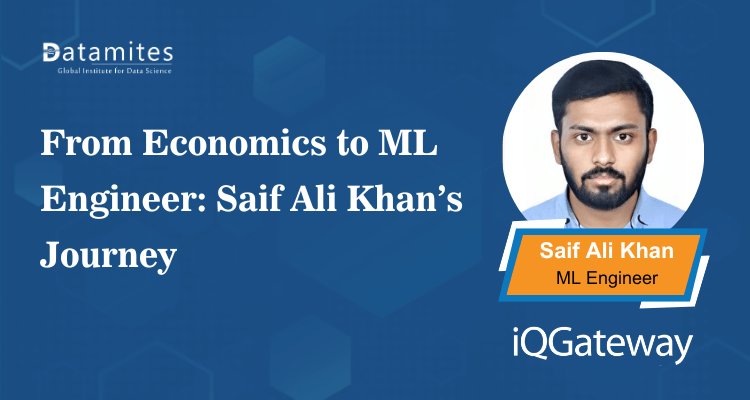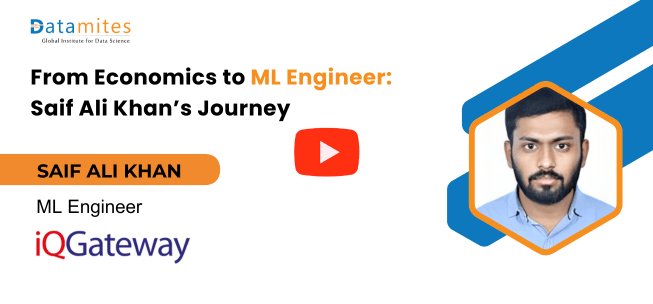Saif Ali Khan’s Journey: From Economics Graduate to ML Engineer
Driven by curiosity and a desire to bridge the gap between data and decision-making, Saif pursued a structured learning path through professional courses, hands-on projects, and continuous upskilling.

In a world where career paths often feel predetermined, Saif Ali Khan chose to rewrite his story. Armed with a degree in Economics, he seemed destined for a conventional role in finance or policy but something didn’t sit right. A growing curiosity for technology, data, and problem-solving led him down an entirely different path: Machine Learning. Today, Saif is a successful ML Engineer at iQGateway, blending logic, creativity, and code to build intelligent systems that solve real-world problems.
Saif Ali Khan’s Leap into ML: A Q&A Journey from Learner to Engineer
In this exclusive Q&A, Saif shares how he transitioned from an Economics graduate to a skilled ML professional.
Q1: Could you briefly introduce yourself and your background before entering the data science field?
Sure! I’m from the Purba Bardhaman district of West Bengal. I completed both my bachelor’s and master’s degrees in Economics. During my postgraduation, I stumbled upon data science and realized that the statistical work I was doing traditionally could be enhanced with modern technology. That curiosity led me to Bangalore, where I enrolled in a certified data scientist course.
Q2: What was your technical knowledge before starting the course?
I had some exposure to coding through C++ during my +2, and I used R during my master’s research. I had a good grasp of statistics, but I had no experience in Python or machine learning before joining the course.
Q3: How was your overall learning experience during the course?
Initially, I was apprehensive because Python and machine learning were completely new to me. But I quickly realized that the level of Python required for data science is not very complex, it's quite beginner-friendly. The real challenge and excitement began when we moved into statistics, machine learning, and deep learning.
Q4: What sparked your interest in machine learning specifically?
My academic background involved time series forecasting in economics. We used traditional models to predict future trends. But after joining the course, I learned about predictive modeling using machine learning, and it blew my mind. I built a stock prediction model and was amazed at how accurately it performed.
Q5: Did you participate in any real-world projects during your training?
Absolutely. I did several projects on Kaggle during my training. Almost every week, I’d download a new dataset and build a project around it within 2–3 days. I studied existing solutions on Kaggle to learn different modeling techniques and approaches. That hands-on practice was crucial for building intuition and technical skills.
Q6: Saif, how important was Kaggle in your learning process?
Kaggle was a game-changer for me. It’s not just about your own solution it exposes you to how others approach the same problem. I learned multiple Python techniques, data processing strategies, and model tuning tricks by exploring other people’s code.
Q7: What was your experience like during Phase 3 of the course?
Phase 3 was the internship and live project stage. My project group consisted of four people, and we collaborated well. We chose a mix of easy and challenging projects to balance our workload. One of our toughest and most exciting projects was ITSM (IT Service Management), which involved classifying support tickets. It was part of a live company scenario, and the experience was deeply enriching.
Q8: What was your job-ready score after Phase 3, and how did your interview preparation go?
My job-ready score was 5.8, which is around average among my peers. After completing the internship phase, I started preparing seriously for interviews but I realized that interview performance depends on how well you present your knowledge.
Q9: How many interviews did you attend before landing your job? What were the key learnings?
I cracked my job offer on the third interview. The first was with Trinity Mobility, and although I was nervous initially, I got comfortable and could answer most questions. I wasn’t selected, but I learned the importance of giving thoughtful, creative answers.
The second was with Worx Innovations, where I couldn’t pass the assessment. They asked about Large Language Models (LLMs), which I hadn’t studied yet. That rejection taught me the importance of continuous upskilling.
Q10: What do you mean by “creative answers” in interviews?
Let me give an example. When asked about how to handle null values, most people would just say, “Use mean or mode.” But I learned that you can also use more advanced methods like KNN imputation. It’s not just about giving textbook answers but showing that you’ve explored deeper techniques that improve model performance. That kind of response sets you apart.
Q11: Is data science a highly technical field? What’s your view?
Not really. Contrary to popular belief, data science isn’t all about complex coding. It’s more about understanding the business problem, identifying the right solution, and selecting the appropriate machine learning algorithm. While some technical knowledge is essential, especially around coding and statistics, the focus should be on problem-solving, domain knowledge, and logical thinking.
Q12: How do you stay motivated and avoid distractions, especially from social media?
That’s a big challenge today. Even though I use social media, I've learned to use it wisely. I follow tech influencers and pages so that my feed occasionally shows technical content amidst the entertainment. This way, I learn while browsing.
Q13: How did the DataMites placement team help you in securing a job?
They were extremely helpful. Initially, I tried job portals on my own but didn’t get any interview calls. Once I enrolled for placement assistance at DataMites, I started receiving calls within 1-2 weeks. It took around two months of guided support, and I landed a job.
Their support team ensures that if you have the skills, you’ll get the opportunities. It’s up to you to convert those into offers. The process really works if you stay persistent and trust it.
Q14: What was your experience with DataMites resume-building support?
They helped a lot. I requested resume templates from the PAT (Placement Assistance Team), and they reviewed my resume, provided feedback, and made necessary corrections. This helped me align my resume with job expectations and increased my chances of being shortlisted.
Q15: What message do you have for data science learners just starting out?
Stay consistent. The ocean of knowledge is vast, and the deeper you dive, the more you’ll learn. Upskilling regularly, revisiting the basics, and diving deeper into each topic will help you stand out. Continuous learning is key whether it’s through your course materials, online communities, or practical projects.
Refer these below articles:
- How Punarvitha Kickstarted Her AI/Data Engineer Journey as a Fresher
- From Electronics Engineer to AI/Data Engineer: Praveen’s Path to Success
- From Career Break to AI/Data Engineer: Kiruthiga’s Inspiring Journey
Key Findings from Saif Ali Khan’s Machine Learning Journey
Through this exploration, readers will gain a deeper understanding of how consistent practice, the right resources, and strategic interview preparation can pave the way for success in the field of machine learning and artificial intelligence.
- Non-Technical Background to Data Science: Saif transitioned from a background in Economics to a career in data science, showcasing that domain knowledge and curiosity can drive a successful switch.
- Limited Technical Exposure Initially: Before the course, he had basic knowledge of C++ and R, with no prior experience in Python or machine learning.
- Beginner-Friendly Learning Curve: He found Python to be beginner-friendly and manageable even without a strong programming background.
- Excitement with Machine Learning: His interest in machine learning grew during the course, especially after building a stock prediction model using real-world data.
- Hands-On Practice via Kaggle: Regular Kaggle projects helped him practice and understand real-world problem-solving and different modeling techniques.
Read these below articles:
- The Demand for Artificial Intelligence in Jodhpur
- Is There Still a High Demand for Artificial Intelligence in Cuttack?
- Exploring the Demand for Artificial Intelligence in Aizawl
Sai Ali Khan’s journey from an economics student in West Bengal to a Machine Learning Engineer in Bangalore is proof that passion, persistence, and the right guidance can help you break into the tech world no matter your background. His story underscores the value of consistent practice, mentorship, and investing in a comprehensive artificial intelligence course in bangalore.
DataMites delivers a well-structured and career-focused Artificial Intelligence training program designed for both aspiring professionals and experienced learners. Whether you're based in Kudlu Gate, BTM Layout, Marathahalli, or nearby localities, the DataMites Artificial Intelligence Institute in Bangalore offers accessible and flexible learning options to help you launch or elevate your AI career. With experienced mentors, customizable schedules, and strong placement assistance, getting started in AI is both achievable and convenient.
Recognized as one of India’s top AI training providers, DataMites has been featured by Analytics India Magazine, standing alongside prestigious institutes like the IITs and IIMs. Participants also gain the advantage of earning globally respected certifications from IABAC and NASSCOM FutureSkills, boosting their credibility and positioning them strongly in the competitive AI job market.

